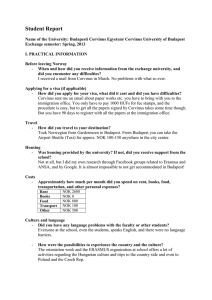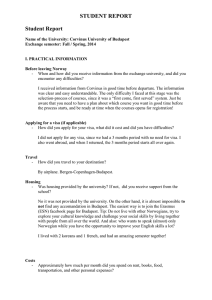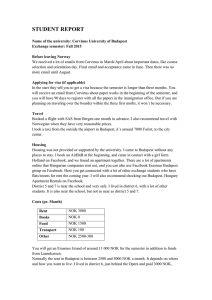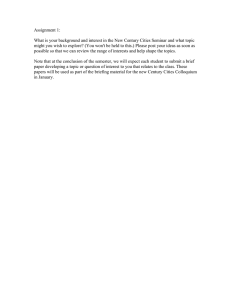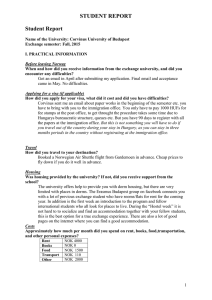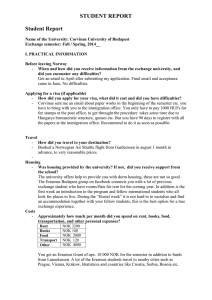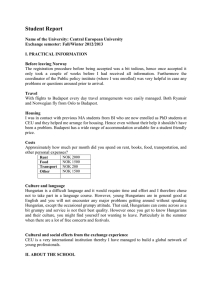Student Report
advertisement
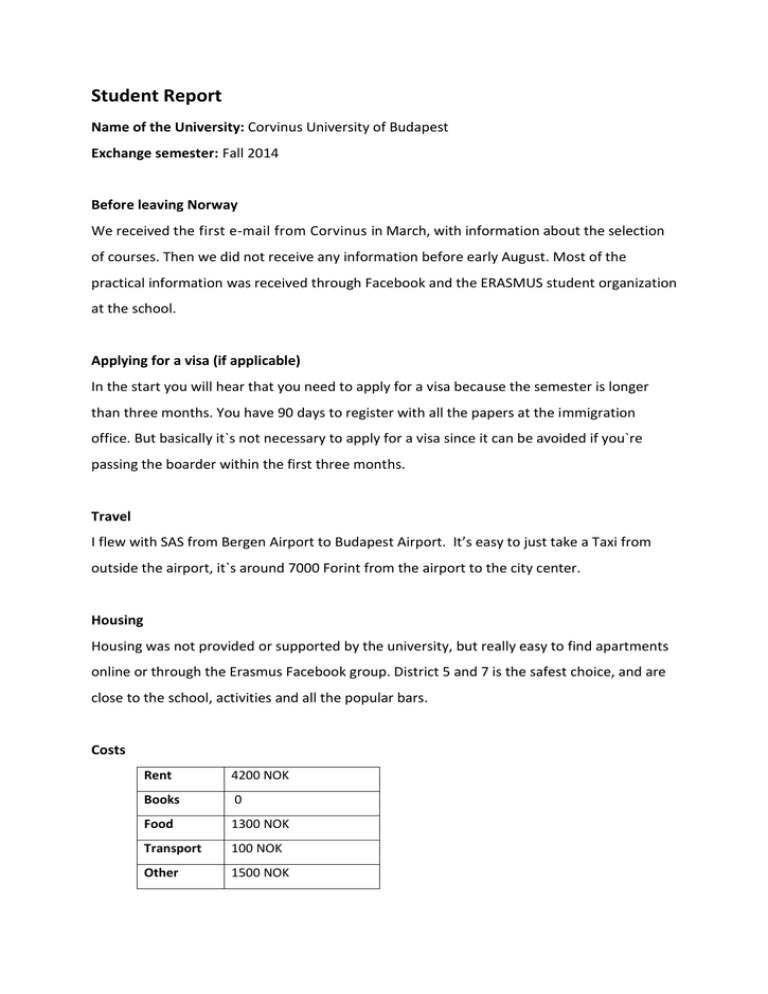
Student Report Name of the University: Corvinus University of Budapest Exchange semester: Fall 2014 Before leaving Norway We received the first e-mail from Corvinus in March, with information about the selection of courses. Then we did not receive any information before early August. Most of the practical information was received through Facebook and the ERASMUS student organization at the school. Applying for a visa (if applicable) In the start you will hear that you need to apply for a visa because the semester is longer than three months. You have 90 days to register with all the papers at the immigration office. But basically it`s not necessary to apply for a visa since it can be avoided if you`re passing the boarder within the first three months. Travel I flew with SAS from Bergen Airport to Budapest Airport. It’s easy to just take a Taxi from outside the airport, it`s around 7000 Forint from the airport to the city center. Housing Housing was not provided or supported by the university, but really easy to find apartments online or through the Erasmus Facebook group. District 5 and 7 is the safest choice, and are close to the school, activities and all the popular bars. Costs Rent 4200 NOK Books 0 Food 1300 NOK Transport 100 NOK Other 1500 NOK Basically normal rent is between 2000 and 3000 NOK a month. I lived alone in a 50 sq. meter apartment close to the parliament, which is one of the safest and greatest areas in Budapest, therefore a higher rent. Food are really cheap and therefore it`s normal to eat out around 23 times a week. Culture and language No language problems with the faculty or other students, everyone spoke well English and the lectures were easy to follow. Erasmus arranged a get to know each other trip in the start of the semester; there it was possibilities to experience some culture and Hungarian traditions. II. ABOUT THE SCHOOL Please describe: The school is located in the centre of the city right next to the Danube. There are two Buildings, one old and one new, the old building is beautiful both inside and outside, and looks almost like a museum. The classes are usually small and it is expected of you to participate in class discussions. A part of your final grade (10%-20%) is judged by attendance, presenting homework, presentations and general discussions. Class attendance is mandatory, and if you miss more than 3 seminars you might fail the course. In late October there is mid-term week where you usually have tests in all your courses in one week. Not be surprised if you have 3 midterms in one day. The final exams are done the same way as the mid- terms. You have the option to take all of them the last week before Christmas, or come back in January and take some of them then. Course registration When and how did you register for courses? Through Neptune on 6th of June, 8:00. Be sure to login at 7:50 and refresh as thousands register at the same time, and the courses fills up in seconds. If you did not get the course you wanted, some courses got more available when the semester starts. When did the add/drop period end? 15th September Academic calendar Arrival date: 26 August First day of the semester: 1 September Last day of classes: 8 September Examination period: 15 - 19 December Any special events/holidays: 23. October Other: Arrival The first week was arranged by Erasmus student organization, and basically was all about get to know each other, and partying in different clubs/bars. You probably going to spend a lot of time later with the people you meet that week. Introduction week was the first week in the semester, before classes started. All the information about school and outside school activities was presented the first day. The upcoming days, the student organization arranged different cultural activities every day, where you could experience all the famous Budapest sights. The International Office The International Office at Corvinus sends out a ton of e-mails every week, with both important information and a lot of unimportant random messages in Hungarian. Promoting BI and Norway There was an international flag party, but no one actually promoted their country in any ways. Social activities The relationship with the Hungarian students was almost none existing. I had some courses with Hungarian students, but the basically staid for themselves and did not interact with the international students. Except for one or to two nice Hungarian students that was in the student organization, and organized big house parties in the beginning of semester. The Erasmus student organization organized a lot of different activities, parties every week, trips to different countries and dinners. III. ACADEMICS In the classroom The classes have one lecture part and one seminar part. The lecture part is theoretical and the seminar part is more practical. In the seminar part you have to be prepared and participate, and it`s mandatory to be there. The classes is really small compared to BI, and you gets a relationship with the teacher either if you want it or not. The teachers are different in they formality and strictness, but in general they don’t tolerate student that don’t behave. In one class, a student disagreed and was being a bit rude to the teacher, so the teacher kicked him out of class and gave him 10 less point of his final grade. The workload differs from course to course, but in general it is much more to do than at BI. It is a lot of assignments, presentations and homework. The level in easier, but he amount of work compensate for the easy level. So at the final exam week, you wish you were back at BI again and had one week to prepare for the exam, not 5 exams on 3 days and 12 hours to prepare. Course materials It is hard to find bookstores that sell the books we need to have for the courses. They have the books at the library, and it is easy and cheap to copy the whole book if needed. The teachers use PowerPoint presentations. Exams Most of the exams were based on the course materials or on the lectures. But some of the teachers also talked about materials in class that later showed up on the exam, so if you miss a seminar/lecture it can be that you don’t have the whole material for the exam. All the courses have a maximum of 100 points. An example of how the course was evaluated: 35 % Written Final exam 25 % Mid-term exam 5 % Presentations 15 % Group work 10 % Class attendance 10 % Class participation/debates Library and technology Nice, big library at the new building. Description of courses: Course code & name Master/ Exam form Bachelor Corporate Finance Bachelor Prerequ Approved as Comments Mandatory Gets better as finance knowledge of Basic isites 90 min None written exam finance. Teacher was strict, but really good and fair. Homework for every seminar, but great learning process. Decision Techniques Bachelor 90 min None written exam Mandatory A boring class as Strategic because of the teacher. It was too practical and difficult to pay attention to the teacher. But also useful and interesting subjects. Personality Types and Team Dynamics Bachelor 2 hours written exam None Elective The teacher was great and made the classes more interesting with practical learning methods. Maybe too much of the same material over and over again. But overall an interesting course. Introduction to Bachelor International Business 90 min None Elective written exam In general an interesting course, but too much theoretical facts. Also a big group project that you have to work on the whole semester. Hungarian for Beginners Bachelor 90 min written exam None Elective Nice and cute teacher. She is nice with the grades, and makes it easy to learn the difficult Hungarian language. On a final note, how will you sum up the exchange experience? It was an incredible semester where I had a lot of academic, cultural and personal positive challenges. Exchange is also an opportunity to establish a wide social network with new friends from all over the world. I have grown in a personal level and had a lot of great experiences both from school and social settings. I`ve learned about cultural differences, seen how hard it is to actually work in groups with people from different nationalities (communication problems). And also been able to experience how different, both positive and negative sides, it is to live in another country than Norway. The social context is important when it comes to exchange, if you`re not social in the period you`re not going to have such a great experience. Budapest is a big, beautiful city with lots of things happening all the time. You experiences new activities, beautiful unique buildings, and in general new places every day.
